

The world will never be the same after the coronavirus. The political and economic upheaval it has unleashed could last for generations.
China has always had a long term outlook. In the late 1990s, the Chinese Communist Party had declared its intention of making China the sole superpower, militarily, economically and geopolitically by 2015. There have been hiccups along the way but the country is pushing its agenda with single-minded purpose. They put aside their sovereign claims to disputed areas to an extent, to develop their economy and, today, China is the second biggest economy in the world.
The COVID-19 outbreak has demonstrated how the entire world’s trade and markets are inextricably linked to China. Every country was worried about its supply chain and the adverse effect on the economy. Today, Chinese manufacturing activity is chugging back to normalcy with the rest of the world’s economies struggling to prevent a recession or even a depression.
Most of the world looks at China with certain amount of suspicion except for its acolytes, such as Pakistan and North Korea. But the fund managers in the West, the hardnosed pragmatists that they are, are looking at investing in China again. They even consider the yuan a safe investment, given the fact that the Chinese have intentionally depressed its value to enhance their exports. The Western fund managers take it as a given that the yuan will get upvalued and the investments will pay good returns.
Chinese businessmen have invested funds in property and assets all over the globe. Most of the countries are going to examine foreign investment plans with a toothcomb, without specifically mentioning China. It is not going to be easy for China to invest in property as before unless they use shell companies.
One Belt One Road (OBOR) is the brainchild of Xi Jinping which is an ambitious plan. It was initiated in 2013 and covers about 78 countries. India had correctly declined to join. China will call in the loans especially from countries who are heavily indebted. Several small counties will not able to pay the loan. China is likely to demand assets and infrastructure in lieu. Chinese companies and China will occupy their prime ports, land and other places. Sri Lanka has already lost Hambantota and China is in control of Gwadar port of Pakistan. It is expected that China will also occupy some fertile land of Pakistan and will exploit the mineral resources of Balochistan, Gilgit and Baltistan.
China’s attempt to realign globalisation to be at the centre, with its ‘One Belt One Road’ initiative, must be checked.
The Chinese government has invested heavily in funding the Chinese diaspora across the world to identify the super achievers especially in the field of science & technology. The arrest of a professor of Chinese origin, for receiving funds to identify such super achievers is a case in point.
The major economies of the world, with a few exceptions are likely to go into recession or even depression. The world’s automotive industry, the telecom industry, the semi conductor industry and many more are dependent on China and China will extract more concessions from all of them in their march to be the sole economic and geopolitical super power while concurrently enhancing its military might.
Time will tell if the coronavirus outbreak was natural or a result of neglect or a pre-planned operation. The outbreak did highlight the risks of a system that puts social stability and ruling party legitimacy above the public interest.
The outbreak happened at the time when officials were gathering for annual meetings of the local Communist Party-run legislatures, when propaganda departments instruct the media not to cover negative stories. That may explain the lack of openness and transparency in this crucial early phase of the outbreak.
China’s primary response strategy was to attribute itself as a victim and utilize strategies that depict good will, anger at external agents and clamping down on dissent. However, as the situation evolved, China was eager to use the outbreak for its own morbid opportunism and point out that its strategies were also increasingly adopted by democracies as well. The Chinese government demonstrated global leadership by sending medical aid in the form of doctors and resources to other countries affected by the virus. This was part of a secondary response strategy – one that can only be analyzed as the pandemic is curtailed.
In case China continues to obfuscate the issue and seek to profit from the catastrophe, there must, at the very least, be outright international condemnation of China for concealing information from its own people and the rest of the world. The international community must unite to ensure China doesn’t take undue advantage of the weakened dispositions of other countries affected by the pandemic. In the medium to long term, supply chains involving China must be reworked.
This crisis has also raised doubts on the vigilance and effectiveness of the World Health Organization (WHO), which is expected to be at the vanguard. Cautious counsel may also argue that any attempts to impose the UN sanctions will be vetoed by China. However, this crisis is an opportunity for international bodies to revive the trust in them. If the Security Council fails, the General Assembly should come together to take appropriate action.
The belligerent country can also be affected. While the US spent trillions of dollars in fighting war on terror, proxy war and hybrid war, China on the other hand focused its entire energies on its four-point modernization program to develop its economy and technical and technological skills.
China is the only country which has successfully contained the disease. Many countries even with the best of health care systems, simply gave in. Rich countries are still shy of spending money on health care, hospitals, free medical services and extending support to the poor nations. Emphasis is on militarism and defence.
The scenario after recovery from the Covid-19 attack is far from clear. We are still barely starting to understand the consequences of Covid-19. Corporates would be forces to seek bailout packages. The US war on terror will suffer from diminished funds.
In conclusion, it can be said that Covid-19 attack has shown that bioweapons can create the perfect geopolitlcal and social engineering environment for full-spectrum dominance.
================
Singapore-based Cmde S Pradeep is an anyalst of international relations
OPINION
Chinese medical materials bound for Italy at a hospital in Hangzhou, s Zhejiang Province, China, 17 March 2020.
















